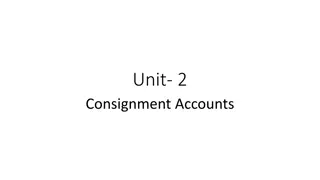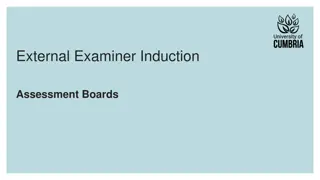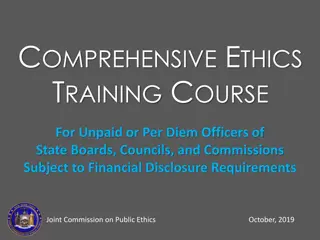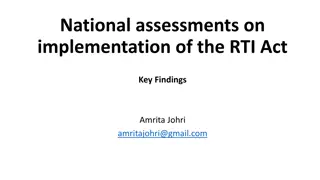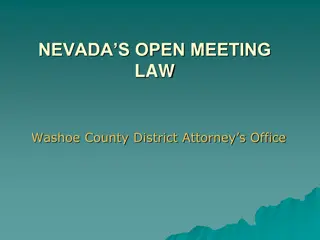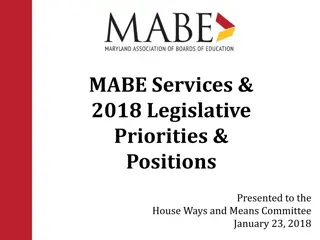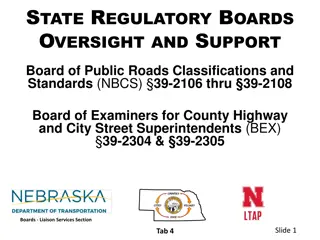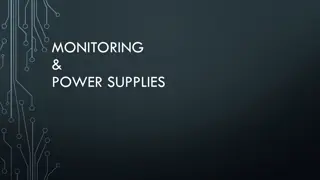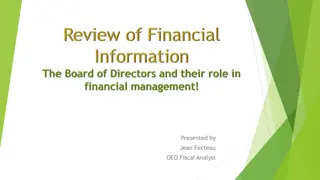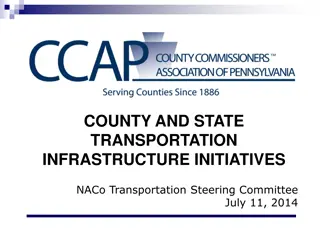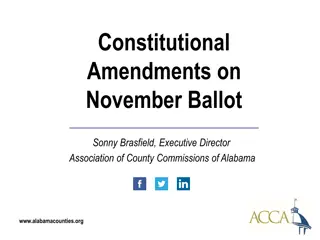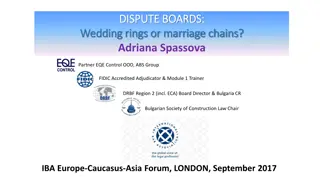Snohomish County Boards and Commissions Member Training Overview
This training focuses on the structure of Snohomish County Government, roles, and responsibilities of Board and Commission Members, understanding key acts and doctrines, and the importance of compliance and education. It highlights the significance of informed and engaged volunteer members serving the county.
Download Presentation

Please find below an Image/Link to download the presentation.
The content on the website is provided AS IS for your information and personal use only. It may not be sold, licensed, or shared on other websites without obtaining consent from the author.If you encounter any issues during the download, it is possible that the publisher has removed the file from their server.
You are allowed to download the files provided on this website for personal or commercial use, subject to the condition that they are used lawfully. All files are the property of their respective owners.
The content on the website is provided AS IS for your information and personal use only. It may not be sold, licensed, or shared on other websites without obtaining consent from the author.
E N D
Presentation Transcript
Welcome to Snohomish County SNOHOMISH COUNTY BOARDS AND COMMISSIONS MEMBER TRAINING
OBJECTIVES Provide a high-level overview of the structure of Snohomish County Government Develop a common understanding of the roles and responsibilities of Snohomish County Board and Commission Members Develop an understanding of the Public Records Act, Open Public Meetings Act, Appearance of Fairness Doctrine and Snohomish County Policies Have questions and comments addressed
Why Training Matters Compliance Although you are serving as a volunteer, in many cases the law treats board members and commissioners the same as Snohomish County Employees Education There is a lot of responsibility that comes with serving as a board member or commissioner. Our goal is to ensure that you receive all of the tools and information that you need to be successful
ABOUT SNOHOMISH COUNTY BOARDS AND COMMISSIONS There are currently 43 boards and commissions that advise Snohomish County Government When all boards and commissions are at capacity, there are over 550 citizen volunteers Board members and Commissioners serve in an advisory role and provide the County Executive and County Council with insight and recommendations on policies and programs that affect Snohomish County residents Board members and Commissioners may only serve on one board or commission at a time
ROLES AND RESPONSIBILITIES Members of Snohomish County s boards and commissions play an essential role in influencing policy that affect our county It is important that each member stays informed about current issues, legislative activity, statutes, and events which may affect their board or commission Members are expected to attend each meeting prepared or communicate absences in advance to their liaison as far in advance as possible
ELIGIBILITY Except otherwise specified by ordinance, candidates for appointment to Snohomish County boards and commissions must meet the following criteria: Possess qualifications for the appointment sought If seeking reappointment, demonstrate the continuing benefits of retaining the board member or commissioner such as satisfactory attendance and participation Reside or work in Snohomish County or show evidence of a special interest in Snohomish County. Residency or employment criteria may vary by board or commission Membership is limited to one position at a time on a board or commission. Members or Commissioners may simultaneously serve on one ad hoc or advisory committee
RESIGNATIONS OR TERMINATIONS If at any time you decide to resign from your position as a Snohomish County Board Member or Commissioner, please provide a written (electronic or manual) letter to the board or commission in which you are a member of through the board or commission liaison Members of Snohomish County boards and commissions may be removed subject to rules promulgated by the particular body Members or Commissioners may be removed by the County Council for misfeasance
WHERE DO BOARDS AND COMMISSIONS GET THEIR AUTHORITY? Boards and Commissions are authorized by Revised Code of Washington (RCW), Snohomish County Code (SCC), and/or by a funding source SCC 2.03.010, Establishes procedures and criteria for recommendation, appointment and service of members of Snohomish County boards and commissions . Each Board or Commission will also have a section of RCW or SCC that establishes their authority, role, responsibilities and scope of work
BOARD AND COMMISSION LIAISONS Every Snohomish County board and commission has at minimum one Snohomish County employees assigned as a liaison Liaisons staff meetings, serve as the board or commission secretary (in most instances), and are able to assist in matters related to the board or commission
LAWS AFFECTING SNOHOMISH COUNTY BOARDS AND COMMISSIONS
Non-Discrimination It is the expectation of Snohomish County that no one shall be discriminated against on the basis of race, religion, age, color, sex, national origin, physical or mental disability, sexual orientation, gender identity and/or expression, marital or parental status, pregnancy, veteran's status or any other categories protected by federal, state or local law. Such discrimination is prohibited and will not be tolerated, nor will any person for those reasons be excluded from the participation in or denied the benefits of any program or activity of the County.
Disability Accommodation The Americans with Disabilities Act (ADA) sets criteria for accessibility and accommodation. Under the ADA, people with disabilities have a right to an equal opportunity for effective participation in the activities of boards and commissions. This is true whether participating as a member of a board/commission or as a member of the public. All meetings and board-sponsored activities and events must be held in wheelchair-accessible locations. Obligated to provide reasonable accommodation upon request. (examples: sign-language interpreters, materials in accessible formats such as Braille, large print and tape, and other forms of auxiliary aids for effective communications). Please work with Human Resources if you receive a request for accommodation.
Workplace Harassment Policy Snohomish County is committed to a work environment that promotes equal employment opportunities and in which all individuals are treated with respect and dignity. Discrimination and harassment in any form undermine the integrity of the employment relationship and will not be tolerated. For purposes of this policy, harassment is verbal or physical conduct that denigrates or shows hostility toward an individual because of his or her race, color, national origin, religion, sex, age, disability, citizenship, marital status, sexual orientation, or any other characteristic protected by law, and that has the purpose or effect of unreasonably interfering with an individual's work performance or creating an intimidating, hostile, or offensive work environment.
What constitutes harassment? Harassing conduct may include, but is not limited to, making jokes on the basis of someone s perceived status such as their race, religion, ethnicity, sexual orientation, disability etc. Making slurs, derogatory or demeaning comments about a person on the basis of their perceived status Mimicking the speech, accent or disability of a person Posting or circulating cartoons or pictures demeaning of protected groups Engaging in threating, intimidating, or hostile acts against a person due to their protected status.
WHISTLEBLOWER POLICY The Local Government Employee Whistleblower Protection Act, prevents local governments from retaliating against employees who report improper government actions. Under this law, each local government must adopt procedures for employees to follow when reporting improper government actions. These procedures must identify persons inside and outside the local government who will receive employees' complaints. Although local governments can require employees to report internally before going to an outside entity, local governments may not impose such a requirement in emergency situations. Additionally, each local government must post both these procedures and information regarding protection against retaliatory actions in a place reasonably accessible to employees. G:\Executive\Orders\Xo16-04 Wistleblower Policy.pdf
ETHICS IN PUBLIC SERVICE As a Snohomish County board member or commissioner you are expected to uphold a high ethical standard All members of Snohomish County s boards and commissions are required to maintain the utmost standards of personal integrity, truthfulness, honesty, and fairness in carrying out their public duties This includes avoiding conflicts of interest or even the appearance of conflicts of interest
ETHICS IN PUBLIC SERVICE Snohomish County requires that all members comply with applicable state ethics law (Chapter 42.23, RCW and Chapter 42.36, RCW) as well as Snohomish County code (Chapter 2.50, SCC) Using a public position for private or personal gain is improper and against the law. Additionally, actions benefiting close relatives are prohibited. Examples of conflicts of interest include but are not limited to: Directing county contracts to a business in which you have a financial interest in Using confidential information for private investments Accepting gifts or favors in exchanged for actions on a board or commission Obtaining personal favors from employees Accepting favors for disclosure of confidential information Engaging in outside employment which assists in non-governmental entities in their pursuit of County business
LOBBYING Members of Snohomish County boards and commissions serve in a unique capacity that affords them the ability to provide information for private investments It is important for Snohomish County board members and commissioners to be familiar with the distinction between advising and lobbying A board member or commissioner becomes a lobbyist when they attempt to influence the passage or defeat of any legislation, rules, standards, rates or other enactments under the Administrative Procedure Act, RCW 18.185.200, Chapter 34.05
PUBLIC RECORDS ACT (PRA) Goals for Today: Understand what the Public Records Act is. Understand what your obligations are as a SnoCo Board or Commission member in regards to the PRA. Understand main concepts of records retention.
The Public Records Act Passed by Initiative (the people) in 1972. Chapter 42.56 RCW: The people of the state do not yield their sovereignty to the agencies that serve them. The people, in delegating authority, do not give their public servants the right to decide what is good for the people to know and what is not good for them to know. The people insist on remaining informed so that they may maintain control over the instruments that they have created.
What is a public record? Any record which contains information related to the conduct of County business or the performance of any County function. (RCW 40.14.010) This specifically includes records related to the conduct of the County s Boards and Commissions. Public records are public, regardless of where they reside. A public record can be in any format, including emails, Word documents, spreadsheets, PDFs, calendars, evaluations, public comment forms, photographs, videos, MP3s, databases, voicemails, text messages, social media postings, maps or drawings, paper records, and any form of communication regardless of physical form.
What is a public records request? A request for any kind of record or specific item about the County or regarding your service as a board or commission member. The County code requires public records requests to be submitted to designated individuals. However, sometimes citizens, the media, attorneys, researchers, or anyone else, gets confused and may submit a request directly to you. Forward this to your department contact ASAP.
What are the Countys responsibilities? We are obligated to produce all public records, unless a specific exemption applies. Even if an exemption applies, we are obligated to gather the public records and retain them in a separate PRR file. We must provide the fullest assistance to the requestor and should apply exemptions sparingly.
What are the Countys responsibilities? 1. GATHER 2. REVIEW The County must examine all potentially responsive records to determine if they are truly responsive and to determine if any information should be redacted or withheld. The County must collect all records that are potentially responsive. 3. PRODUCE 4. RETAIN The County must make all responsive records available to the requestor. The County must keep a complete copy of all responsive records in a separate file, in both their redacted and unredacted forms.
What are Board/Commissioner responsibilities? Forward any public records requests you may receive to your department contact. When we receive a request you will be contacted. You are responsible for searching thoroughly and promptly. This may mean searching email accounts, computer files, calendars, paper files, or personal internet accounts. Once you have found records you must provide them to the County. You may be asked to complete an affidavit about your search.
Public vs. Personal Public Records are public regardless of where they reside. Home computer? Social media pitfalls. Questions?
OPEN PUBLIC MEETINGS ACT (OPMA) All meetings of the governing body of a public agency shall be public and all persons shall be permitted to attend any meeting of the governing body of a public agency, except as otherwise provided in this chapter. RCW 42.30.030
Basic Requirements of OPMA All meetings required to be open and public. RCW 42.30.030. Quorum: Generally, a meeting occurs when a majority of the body is in attendance and action is taken. RCW 42.30.020(2) and (3). All persons permitted to attend meetings with no preconditions. RCW 42.30.040. No voting by secret ballot. RCW 42.30.060(2).
Basic Requirements of OPMA cont. Public notice requirements for regular and special meetings. RCW 42.30.070, 42.30.077, and 42.30.080. Meeting agendas must be made available online no later than twenty-four hours in advance of the meeting. RCW 42.30.077. Adjournments and continuances of meetings must comply with particular notice requirements under the OPMA.RCW 42.30.090 and 42.30.100.
OPMA Key Definitions Governing body - the multimember board, commission, committee, council, or other policy or rulemaking body of a public agency, or any committee thereof when the committee acts on behalf of the governing body, conducts hearings, or takes testimony or public comment. Meeting meetings at which action is taken. Action - the transaction of the official business of a public agency by a governing body, including but not limited to receipt of public testimony, deliberations, discussions, considerations, review, evaluations, and final actions. Final action - a collective positive or negative decision, or an actual vote by a majority of the members of a governing body.
What constitutes a meeting? Under the OPMA, a meeting occurs whenever there is action, which includes not only a final official vote but also discussion, deliberation, or evaluation. RCW 42.30.020(3) and (4). A meeting occurs if a quorum of the members of the governing body discusses or considers a matter within its authority, regardless of where that discussion or consideration might occur, and regardless of whether that discussion or consideration leads to final action. Examples of meetings under the OPMA may include: study sessions, retreats, conference calls, email exchanges, and text messages.
What are the penalties for violating the OPMA? Actions taken at a meeting not open to public and properly noticed shall be null and void. RCW 42.30.060. Personal Liability: Members of a governing body who attend a meeting where action is taken in violation of the OPMA with knowledge of the violations are subject to personal liability ($500 for first violation, $1000 for each additional violation). RCW 42.30.120. Agency Liability: Any person who prevails in an OPMA case shall be awarded attorney fees and costs. RCW 42.30.120. Potential loss of public trust
Recommendations Use email sparingly, if at all, and only for non-substantive purposes. As an alternative to emailing materials to other members in preparation for a meeting, have a designated staff member email documents or provide hard copies to each member. When in doubt whether a particular communication or event may constitute a meeting subject to the OPMA, err on the side of caution by complying with all OPMA requirements.
Use of Snohomish County Email Accounts
Snohomish County Email Accounts All Snohomish County Board and Commission members will be assigned their own email account Your board or commission liaison will provide you with an instruction packet for setting up your new account Snohomish County asks that these accounts be used for all matters pertaining to board or commission business If you currently use a personal email account for board or commission related matters, please discontinue this use
Information Security Key Points Never share your login ID and password Do not write down your password Use strong passwords or passphrases Be wary of email attachments and links to external websites Contact the Service Desk (425-388-3378) with any technical or security-related questions
Privacy All messages sent or received using email resources are owned by Snohomish County. This means that you should have no expectation of privacy in the use of the email system. Please do not send personally identifiable information (PII) such as credit card numbers, social security numbers, or diver s license numbers over email Be aware of potential phishing attempts to gather sensitive information and report any such instances to the Service Desk (425- 388-3378) and your liaison.


